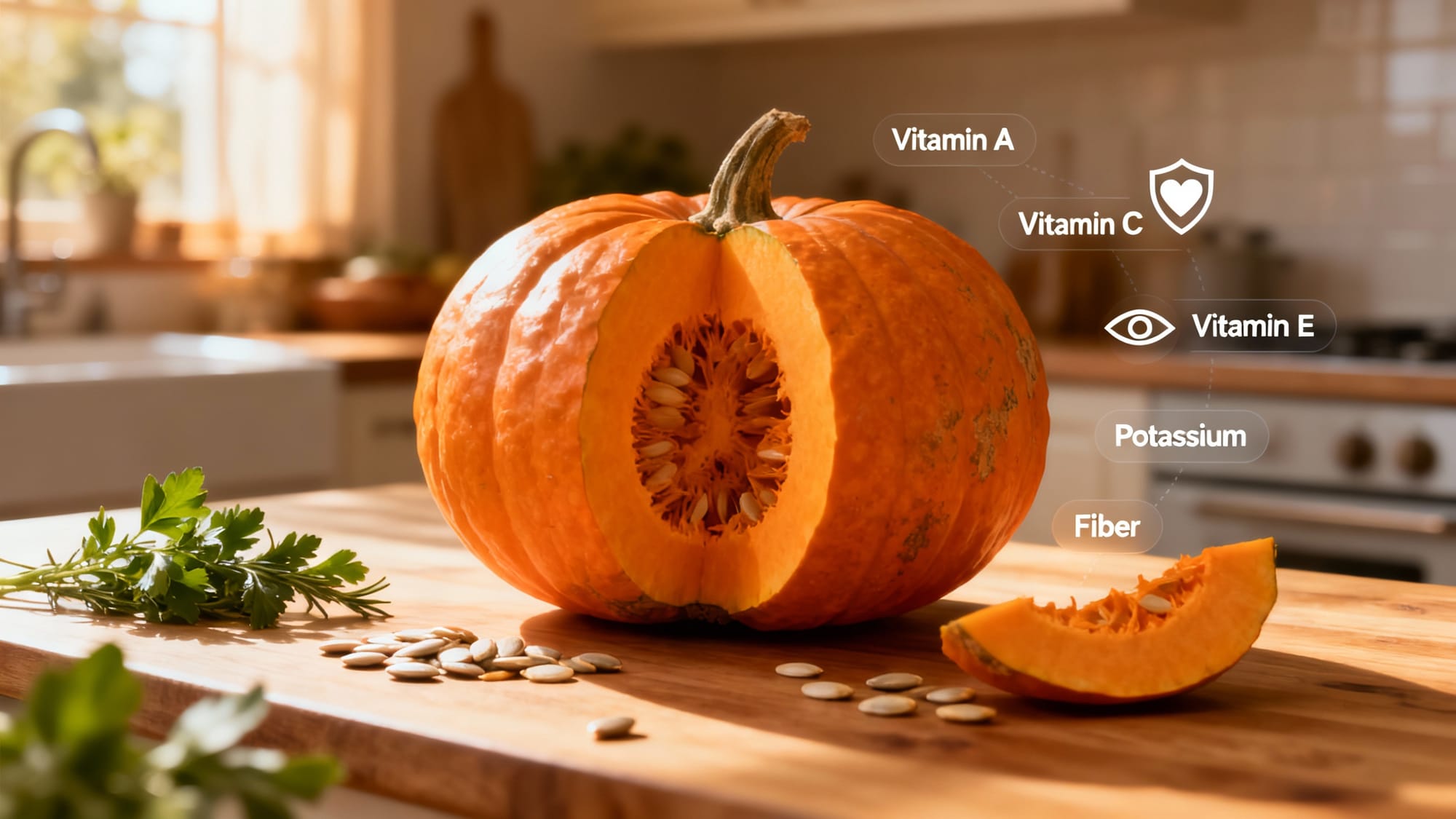The Health Benefits of Pumpkin: A Scientific and Nutritional Review

Pumpkin, a nutrient-rich fruit often associated with autumn, is more than just a seasonal decoration or a pie ingredient. It belongs to the Cucurbitaceae family and is a powerful source of bioactive compounds, vitamins, and minerals. Recent research suggests that both the pulp and seeds of pumpkin offer a variety of health benefits—from improving eye health and supporting immunity to protecting the heart and aiding weight loss.
This article offers a comprehensive look at the health effects of pumpkin, including insights from peer-reviewed scientific literature, nutritional databases, and reputable health sources.
Scientific Research Review | Web-Based Nutritional and Health Insights | Practical Health Applications | Conclusion | Sources & Citations
Scientific Research Review
1. Nutritional Value and Bioactivity
A 2022 review titled “Nutritional value, phytochemical potential, and therapeutic benefits of pumpkin” (PMC9182978) found that:
- Pumpkin flesh and seeds are rich in carotenoids (mainly β-carotene), vitamins A, C, and E, and minerals like potassium and magnesium.
- They exhibit antioxidant, anti-inflammatory, antimicrobial, anti-carcinogenic, and antidiabetic potential.
- Phytochemicals in pumpkin have shown potential in preventing chronic illnesses such as cardiovascular diseases and metabolic disorders.
2. Antioxidant and Anti-inflammatory Properties
Pumpkin’s high carotenoid and polyphenol content helps scavenge free radicals, potentially lowering oxidative stress and chronic inflammation. This makes pumpkin a promising candidate in dietary strategies for managing chronic diseases.
3. Antidiabetic Effects
In a 2020 animal study, pumpkin extract demonstrated the ability to reduce blood glucose levels and increase insulin production. Although human trials are limited, it suggests pumpkin's bioactives may help manage type 2 diabetes by modulating glucose metabolism.
4. Pumpkin Seed Oil (PSO)
Several studies highlight pumpkin seed oil’s benefits, including:
- Anti-hypertensive properties (due to its high content of unsaturated fatty acids).
- Prostate health support.
- Improved urinary function in men with benign prostatic hyperplasia (BPH).
Research also indicates PSO may help reduce inflammation and improve lipid profiles.
Web-Based Nutritional and Health Insights
Trusted health and nutrition portals emphasize the practical health benefits of pumpkin:
Vision Health
Pumpkin is rich in beta-carotene, which the body converts to vitamin A — essential for maintaining good vision, especially in dim light. It also contains lutein and zeaxanthin, which may help reduce the risk of cataracts and macular degeneration.
Source: Healthline
Immune Support
Vitamin A plays a crucial role in maintaining the integrity of skin and mucosal cells, which are the body’s first line of defense. Pumpkin also contains vitamin C and E, both contributing to immune health.
Source: Mayo Clinic Health System
Heart Health
The potassium in pumpkin helps manage blood pressure, and its fiber helps reduce cholesterol. Studies suggest potassium-rich diets are associated with a lower risk of stroke.
Source: Medical News Today
Weight Management
Pumpkin is low in calories (about 50 kcal per cup) and high in fiber, promoting satiety and healthy digestion, making it ideal for weight-loss diets.
Source: WebMD
Skin and Cellular Health
The antioxidants in pumpkin, especially carotenoids, protect the skin from UV damage and oxidative stress. This supports youthful skin and reduces the risk of skin cancer over time.
Source: WebMD
Benefits of Pumpkin Seeds
Known as “pepitas,” pumpkin seeds are high in magnesium, zinc, and omega-3 fatty acids. They support prostate health, reduce inflammation, and promote restful sleep due to tryptophan content.
Source: New York Post
Practical Health Applications
Here are a few evidence-backed ways to include pumpkin in your daily diet:
| Method | Benefits |
|---|---|
| Roasted Pumpkin Chunks | Rich in fiber and antioxidants. Add olive oil for fat-soluble nutrient absorption. |
| Pumpkin Puree in Soups & Baking | Use as a butter substitute in baked goods to reduce fat and add nutrients. |
| Smoothies with Pumpkin | Blend with banana, cinnamon, and yogurt for a nutrient-dense snack. |
| Roasted Pumpkin Seeds | Eat as a snack or salad topper. Supports prostate and heart health. |
Conclusion
Pumpkin is a functional food with diverse health benefits backed by both traditional use and modern scientific research. Its high nutrient density, antioxidant load, and low-calorie content make it a valuable addition to a balanced diet.
Top Health Benefits Recap:
- Supports eye and vision health (beta-carotene → vitamin A).
- Boosts immune function (vitamin A, C, E).
- Enhances cardiovascular health (fiber, potassium, seed oil).
- Contributes to anti-inflammatory and antioxidant defenses.
- Aids weight management and digestive health.
- Seeds promote prostate, bladder, and metabolic wellness.
